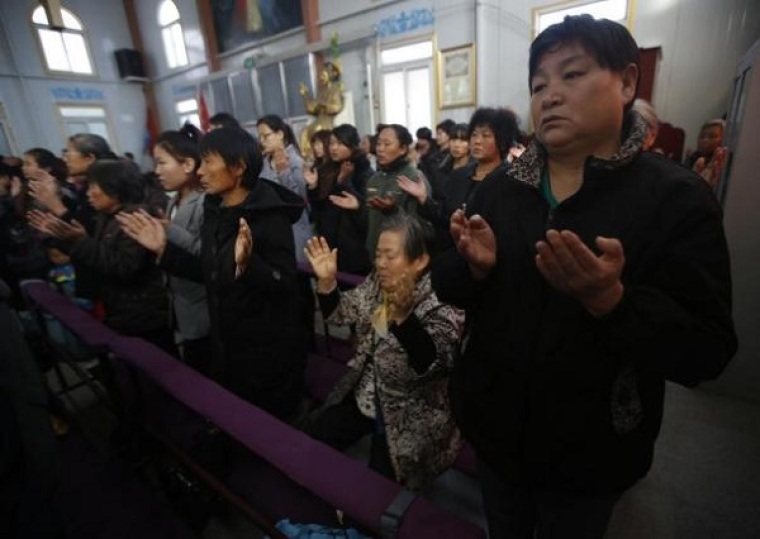Five Chinese Christians face long prison sentences after failed appeals

Five Christians are facing long prison sentences after a court in China's northwestern Xinjiang rejected their appeals.
In April, the Christians received sentences ranging between three to five years in prison after they hosted a private Christian meeting in a home last year, which the court ruled was "gathering a crowd to disturb public order."
According to China Aid, Yang Zhaocun and Wang Lulu were sentenced to five years, while Cheng Yajie received a four-year prison sentence. Liu Yan and Zheng Lan were each sentenced to three years' imprisonment.
The five Christians filed appeals to overturn the sentences, but a Chinese court rejected their pleas on June 27.
The verdict noted that there were more than 50 people who participated in activities that were deemed "illegal," including studying the Bible, during the gathering at Zheng's home on March 5, 2016.
Wang and Cheng had admitted that they planned the gathering, while Zheng said she had been providing accommodation to personnel from a Christian organization since 2011.
The five Christians were held in custody for more than a year before they were sentenced on April 18.
Zheng reportedly had no connection to the Christians who were gathering at her home. She had been prosecuted for agreeing to accommodate them and for organizing large-scale Bible studies.
In her appeal, she contended that she grew up in abject poverty and did not receive a high level of education, causing her to be unaware of stipulation about such gatherings.
Liu's appeal argued that the official charge was only meant to convict behaviors that disrupt the process of work, production, business teaching, and scientific research and is determined by the "seriousness" of the infraction.
She also noted that while Article 12 of the Regulations on Religious Affairs states that religious gatherings usually should be held in registered religious sites, it does not formally stipulate sanctions against small religious gatherings in private homes.
The court ruled that the arguments of the appeals did not match the details of the case, which accused the Christians of the crime. However, the verdict failed to elaborate on how the gathering had disturbed public order, making the arrests completely arbitrary.
The judge reportedly disclosed in private that Xinjiang's politics and law committee issued a document prohibiting house churches and ordering the punishment of the attendees. China Aid noted that the document has not yet been released to the public.
 Christians don't have to affirm transgenderism, but they can’t express that view at work: tribunal
Christians don't have to affirm transgenderism, but they can’t express that view at work: tribunal Archaeology discovery: Medieval Christian prayer beads found on Holy Island
Archaeology discovery: Medieval Christian prayer beads found on Holy Island Presbyterian Church in America votes to leave National Association of Evangelicals
Presbyterian Church in America votes to leave National Association of Evangelicals Over 50 killed in 'vile and satanic' attack at Nigerian church on Pentecost Sunday
Over 50 killed in 'vile and satanic' attack at Nigerian church on Pentecost Sunday Ukrainian Orthodox Church severs ties with Moscow over Patriarch Kirill's support for Putin's war
Ukrainian Orthodox Church severs ties with Moscow over Patriarch Kirill's support for Putin's war Islamic State kills 20 Nigerian Christians as revenge for US airstrike
Islamic State kills 20 Nigerian Christians as revenge for US airstrike Man who served 33 years in prison for murder leads inmates to Christ
Man who served 33 years in prison for murder leads inmates to Christ


 Nigerian student beaten to death, body burned over ‘blasphemous’ WhatsApp message
Nigerian student beaten to death, body burned over ‘blasphemous’ WhatsApp message 'A new low': World reacts after Hong Kong arrests 90-year-old Cardinal Joseph Zen
'A new low': World reacts after Hong Kong arrests 90-year-old Cardinal Joseph Zen Iran sentences Christian man to 10 years in prison for hosting house church worship gathering
Iran sentences Christian man to 10 years in prison for hosting house church worship gathering French Guyana: Pastor shot dead, church set on fire after meeting delegation of Evangelicals
French Guyana: Pastor shot dead, church set on fire after meeting delegation of Evangelicals ‘Talking Jesus’ report finds only 6% of UK adults identify as practicing Christians
‘Talking Jesus’ report finds only 6% of UK adults identify as practicing Christians Mission Eurasia ministry center blown up in Ukraine, hundreds of Bibles destroyed: 'God will provide'
Mission Eurasia ministry center blown up in Ukraine, hundreds of Bibles destroyed: 'God will provide' Church holds service for first time after ISIS desecrated it 8 years ago
Church holds service for first time after ISIS desecrated it 8 years ago Burger King apologizes for 'offensive campaign' using Jesus' words at the Last Supper
Burger King apologizes for 'offensive campaign' using Jesus' words at the Last Supper Uganda: Muslims abduct teacher, burn him inside mosque for praying in Christ’s name
Uganda: Muslims abduct teacher, burn him inside mosque for praying in Christ’s name